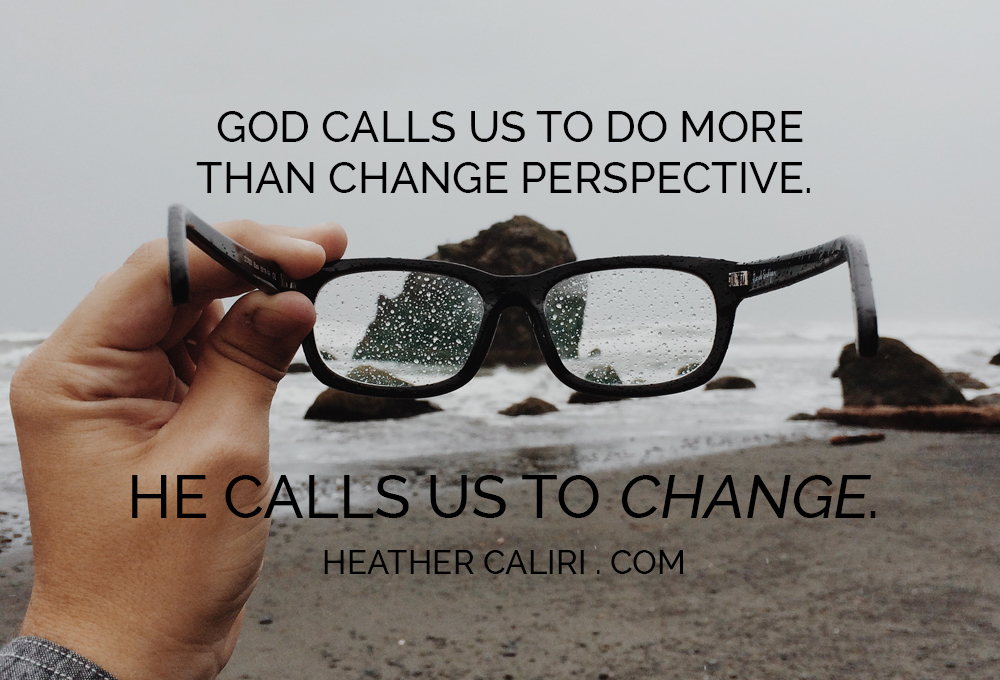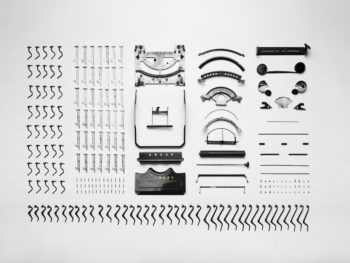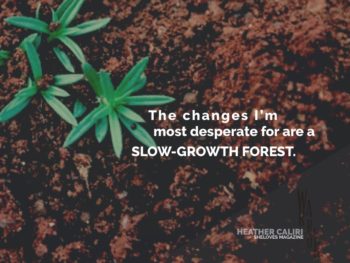
The other day in the car, I heard a brief devotional about a woman struggling with grouchiness on a dull grey Monday. She saw her child looking at the drizzle outside with wonder. The child’s awe allowed the speaker to shift perspective and change her attitude about her surroundings.
I think there was truth there. A shift in perspective can do wonders for bad moods, conflict, or bad habits. And yet the devotional made me grit my teeth.
Look, sometimes it’s enough to angle our head a few degrees to catch afresh God’s presence.
But more often, God calls us to do more than change perspective. He calls us to change.
- If you are clinically depressed, Jesus is not calling you to get a more godly perspective. He’s calling you to get treatment.
- If you’re grieving a sexual assault, Jesus isn’t asking you to change your perspective on what happened. He desires for you to have justice.
- If you’re bewildered by a childhood of abuse, Jesus isn’t counseling you to see everything that happened through rose-colored glasses. He is giving you permission to get angry.
- If you’re suffering from chronic illness or pain, Jesus isn’t asking you to spiritualize your experience and pretend it’s hunky-dory. He’s encouraging you to be honest with him and yourself about your suffering.
I used to think submitting my cares to Jesus meant I’d achieve a kind of Platonic calm about them, and that if I shifted perspective enough, my problems, along with all my pesky emotions (fear, anger, sadness, self-loathing) would magically go away.
I kept hoping God would heal me if I ed my wounds in pretty Christian language.
- So I kept submitting my shame to Jesus, without ever questioning where the shame came from.
- I prayed about my anxiety, without ever investigating why I felt anxious.
- I theologized about why more prayer didn’t help me, without wondering why my approach didn’t work.
- I shamed myself for my failure to get better without ever realizing I’d never dealt with the bedrock of what ailed me.
And when I shared about those hard things with other Christians, I made damn sure to couch everything in language that affirmed God’s freedom, Jesus’ victory, the Spirit’s blessing, even though I didn’t feel victorious, #blessed, or free.
God doesn’t #bless stuff to whisk away unpleasantness. He’s not a shoddy Better Business Bureau, giving our cracked and bleeding souls A+ ratings. He accepts and loves us right now, but he has no desire for us to stay in lives of shame, shivering, fear, and bewilderment. Forget #blessed. He wants to give us actual blessings.
If our lives don’t feel life-giving, if freedom feels like a pipe-dream, let’s not slap a #redeemed sticker on them. Most of us don’t need a shift of perspective to see our shame and fear differently. No: we desperately need real change.
Look, I’m not saying you are ever in danger of getting an F rating from God. Wherever we are, whatever our quandary, we are beloved, accepted, invited. He can redeem every situation, every dysfunction, every death from the grave.
But calling Lazarus alive before Jesus arrived at his tomb in truth and power is lying. It’s much easier to shift perspective superficially than face our grief, fear, and inertia.
After all, a change in perspective doesn’t require any movement on our part. By definition, you stay in place.
Repentance is a different animal. Repentance involves abrupt U-turns. Risk. Danger. A certain willingness to move.
I think the reason so many Christian platitudes irk people who have been through hell is because platitudes assume resurrection is easy. God won’t give you more than you can handle. All things work together for the good. God is in control.
Resurrection is available to us always. But just like Christ demonstrated, there will be a death involved to get there. A death of our assumptions. Of our coping mechanisms. A death to our competence or our reputation. A death of our comfortable theologies.
A death of easy, taken-for-granted #blessings.
Jesus isn’t about wishful thinking or papering over our pain. Jesus is about absolutely, positively, raising us from the grave.














 Everything I Know About Healing
Everything I Know About Healing
Thank you for this. I needed it today.
Oh, good, Lara. I pray for healing and wholeness for you!
This is so good! Dressing our pain and shame in ‘nice’, faux-christian language does nothing but add to the problem. Let’s get real and get the help we need to change!
YES! I’m so with you on this, Diana.
This is so true! I hadn’t really connected the dots before I read this, but this has been my experience. I prayed, and prayed, and said all the Christianese things, and nothing about any of my situation changed. It wasn’t until I started making changes – going to therapy, quitting drinking, setting and ENFORCING boundaries – that the craziness of my life and the constant guilt and shame and wondering “What the hell is wrong with me?!” started to shift. Instead of trying to control people and things around me, *I* had to change. Once I started changing my behavior, my thought process started to change. And once I stopped self-medicating, I was able to grieve and be angry like I needed to do years ago. Little by little, I am finding peace. Real peace. Not platitude peace with rainbows, butterflies, and little ponies, but peace even when I am angry and grieving because now I know those emotions are healthy. I’m supposed to feel them, not stuff and suppress while quoting “I can do all things…”
Oh, man, Martha, this really speaks to me. And it sounds SO MUCH like what I’ve gone through too. Healing is so much more brutal and sharp-edged and fierce than Christians usually describe it. No unicorns–but the PEACE is crazy good and so so so worth it.
This is so, so, good. I needed to hear this today.
Thank you, Emily!
Thank you again! This applies to big things going on in my life, but honestly, it mostly made me think of my yard. I’ve been frustrated and depressed by my yard. It’s almost an acre in the the country and it’s basically a big flat boring weed patch. I don’t have a big budget to get it landscaped and filled with lovely flowers. Instead it seems like for every weed I pull ten more spring up somewhere else. I will walk around my yard and my heart will sink lower and lower. I’d been feeling guilty for the ungratefulness I was feeling. “I just need to be more thankful,” I chided myself. But I’m learning to listen to the messages my emotions are sending me. Part of me wants to acknowledge that I’m overwhelmed and move to a place with less property but that’s not practical for our finances or my family. Reading your article made me realize that I can take that frustration and use the energy from it to get out there and make a difference. I am mightier than the weeds! I can make a difference one flower bed at a time! I also want to call up a couple friends and see if they will be my gardening mentors. How I feel about my yard effects my life enough that I want to DO something about it. Anyway, this was super long, but bottom line: Thank You. Your writing is making a practical difference in my life.
HA! I so identify with this–we’ve never had a yard I’ve liked (or one with automatic irrigation…and we live in a near-desert). And I’ve shamed myself for neglecting our yards and hating them and not having a green thumb. Two months ago, we finally had saved enough money for re-landscaping and now we have irrigation and plants to take care of. I assumed I’d feel overwhelmed at the yard work, but instead every day I _want_ to go out there and potter a little bit because I love these plants and I want them to thrive. It’s an entirely different feeling.
I think asking for help is a great idea. I actually feel REALLY guilty for spending so much $$ on the yard (it was expensive to do, sigh). But if it were a communal effort, and you could find ONE part you could work on and make beautiful. We are so loathe to ask for help with big projects like this, but how lovely would be the result–a sort of modern-day barn raising? I’m cheering you on, Amanda.
Yes. this. A truly helpful shift in perspective doesn’t paper over our pain so we can pretend it’s not there or shame us into being better. A truly helpful shift in perspective pulls off those coverings so we can see where we need to start digging. Right now I’m digging into some fears that have kept me stuck for a long time. It’s hard and messy and painful. But I know I don’t just need a different way of seeing things. I need to risk and move and act and let go. I need to be willing to change. Thanks for this, Heather.
“A truly helpful shift in perspective pulls off those coverings so we can see where we need to start digging.” YES. (and you’re welcome).
I think we can also have a lot of grace for ourselves about getting this mixed up–honestly, standard-issue Evangelicalism has often led me AWAY from healing. Any time we’re told to ignore our feelings and desires because they’ll lead us astray we’re getting further off-track. Not that we should just let our emotions rule us willy-nilly, but better to be really freaking AWARE of them then try to shove them where the sun don’t shine.
yes, yes, and YES. 🙂